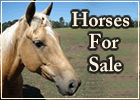

Discipline for Biting or Nipping
Biting or nipping are dangerous and disrespectful behaviors which must be corrected. The natural human instinct is to react aggressively by hitting, slapping or pushing the horse. All these reactions are counter-productive and will not cure the situation. Consistent application of the below described plan is the key to success.
- Prevention – Never, never feed anything from your hand! This will cause many unwanted behaviors including nipping, crowding, pushing, mugging and lack of attention.
- Awareness and positioning- When I am with any horse I am always aware of my position relative to their nose. I use the backing exercise or rhythmic waving elbows to place the horse at a respectful distance from me. I insist on respect for my space at all times with every horse so I remove their temptation to nose around on me. I never turn my back on any horse that is within arm's length of me without watching him over my shoulder.
- Attention- With a horse who wants to have his nose in my space, I pay him lots of loving attention with both hands all around his head, stroking his cheeks, forelock, lips, nostrils, ears. I want to make sure I am meeting his needs for attention.
- More Attention- When I step away if he moves his nose towards me I will give his nose more attention than he really wanted by rubbing his nose quickly but gently, even running my fingers up his nostrils, until he chooses to move his nose away. When he does I leave him alone. If his nose comes back into my space again I greet it with extra enthusiasm. After a few times repeating this process he will decide to leave his nose out of my space.
- Get him busy- If he starts doing anything I don't like I will back him, circle him or do any of the other Six Keys to Harmony ground exercises until he settles and stands quietly.
- Backing as discipline - If I have practiced the ground exercises and consistently done numbers 1 through 4 above then being bitten by a horse almost never happens, however in the rare case that a horse does actually bite me I will totally loose my composure for 5 seconds going totally berserk, yelling, jumping and backing the horse vigorously with the lead rope.
In this 5 second discipline there are some rules you must obey:
- I cannot do this at all if he is tied up.
- I cannot do this at all if I am not able to do it instantly, within the first few seconds after he has bitten me.
- I cannot do this at all if there is a chance the horse could injure himself due to a small space, near a fence or objects close by.
- I cannot do this at all if it would put a person or another horse in danger such as in a barn aisle with other people around or even in the arena if someone else happens to be standing or riding nearby where the horse might bump into them.
- I cannot strike the horse with any part of my body or any object
- I must remain emotionally stable without an attitude of anger or vengeance
- I must cease in exactly 5 seconds, no longer.
Done correctly, I look at this 5 second discipline as a one-time event, maybe
twice at the most. I don't want to cause him any pain because horses don't learn from pain. I just want him to have a major emotional reaction and know that he got in trouble. At the end of the 5 seconds I completely return to my nice, calm self as if nothing happened and rub him gently on his neck to re-establish my relationship. I want him to know he made a big mistake but I still love him and he is not bad.
Horses don't bite people or other horses they like and respect so spend plenty of friendly time with him and work hard at establishing a solid, respectful relationship with him.

Ed Dabney is an internationally acclaimed clinician, presenting horsemanship and riding clinics all over the US and in Europe. In 2007, Ed was named Champion of the East Coast Trainer Challenge Series by Equine Extravaganza. Ed was honored to have been selected by the University of Georgia to teach their senior level Young Horse Training course.
His training articles have appeared in many major national magazines. Ed produces instructional videos and the “Gentle Horsemanship” TV program which has been seen on RFD-TV.
Ed's blending of natural horsemanship and classical equitation has made an indelible mark with students all across the United States and now also in Europe, drawing the attention of serious riders searching for the lightest touch and the deepest connection with their horses irrespective of breed or discipline.


